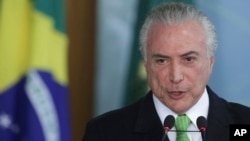Congressional support for Brazilian President Michel Temer is weakening, lawmakers said on Friday, days before the lower house is expected to vote on whether he should stand trial on a corruption charge.
Temer, whose center-right government's approval rating is languishing in single digits, is clinging to power after being charged with arranging to take millions of dollars in bribes, the first sitting Brazilian president to face such criminal proceedings.
The charge has increased tensions in an already chaotic political scenario in Latin America's biggest country and have led investors to question whether the government will be able to ush through a business-friendly agenda of social security and labor reforms.
Key to Temer's survival is whether the Brazilian Social Democracy Party (PSDB), Brazil's third largest, will stick with his coalition despite deep divisions in its ranks. If it abandons Temer, many smaller parties are expected to follow suit.
PSDB deputy Caio Narcio, who has supported Temer and has cautioned his party against leaving the coalition, said on Friday the president's situation was deteriorating.
"Temer's government is being hollowed out. It is encountering weekly defeats," Narcio said.
Many in the PSDB are wary of backing Temer for too long as the party plans to run its own presidential candidate next year.
Some of its legislators are also keen to distance themselves from Temer to improve their own electoral prospects.
Several lawmakers, who asked not to be identified because of the sensitivity of the issue, said support was growing for lower house speaker Rodrigo Maia, the first in the line of succession.
If the house votes to put Temer on trial in the Supreme Court, Maia would take office for 180 days.
"Rodrigo is now seen as a way out of the crisis, when before he was not," Narcio said.
Maia taking power would not slow efforts to pass economic reforms, lawmakers said. It might even help accelerate them as the president would no longer be embroiled in corruption charges.
Center-right Progressive Party deputy Jerônimo Goergen said Maia called him to say that, although he was not presenting himself as a candidate, he would keep the economic policy unchanged if he were to replace Temer.
Temer's press office did not respond to requests for comment. Maia's office could not immediately be reached for comment.
General Prosecutor Rodrigo Janot charged Temer last week in a graft scheme involving the world's largest meatpacker, JBS SA. Executives said the president took bribes for resolving tax matters and facilitating loans from state-run banks.
Janot said Temer made deals under which JBS would have paid him 38 million reais ($11.57 million) over the next nine months.
Temer has repeatedly denied the accusation.
Under Brazilian law, two-thirds of the lower house of congress must vote to put a sitting president on trial. Although the vote is expected as soon as next week, it could be delayed to early August after a congressional recess.
Temer is expected by most to survive the lower house vote on the first charge against him.
But Janot piled on pressure last week by saying he will likely charge Temer with racketeering and obstruction of justice in the coming weeks.
Brazilian media also reported that two former top aides, including jailed ex-house speaker Eduardo Cunha, are close to signing plea-bargain deals that could provide evidence of wrongdoing by the president.
There is a growing consensus among lawmakers and political experts that any votes on new charges would see Temer's support rapidly evaporate.
Lucas de Aragao, a political analyst with Arko Advice in Brasilia, told Reuters it was premature to envisage a Maia presidency.
"But obviously there is a movement in that direction, it is in the interests of many distinct factions within congress," Aragao said.
($1 = 3.2830 reais)





